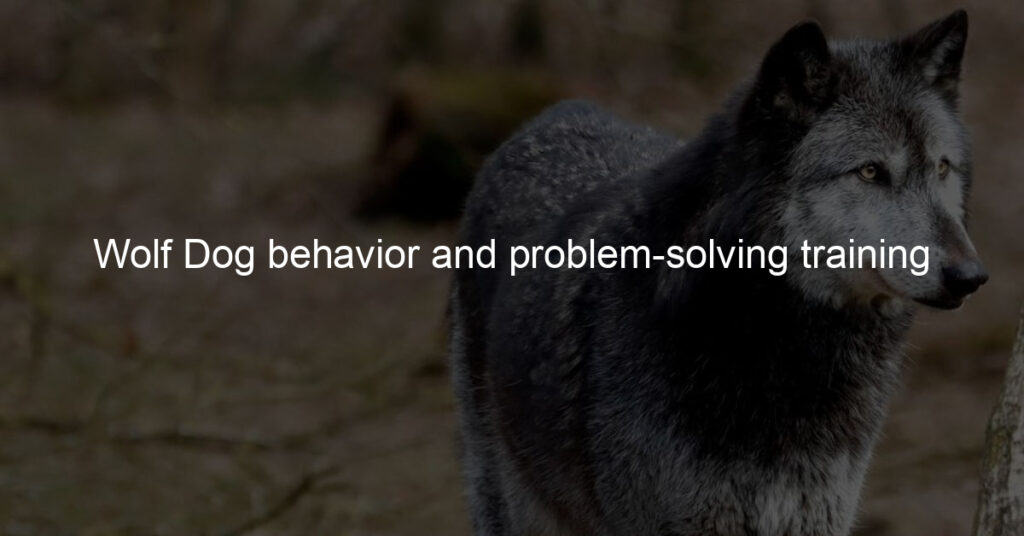Are you a wolf-dog owner looking for ways to better understand your pup’s behavior and establish consistent training methods? Whether it’s barking at an intruder or stealing your dinner off the kitchen counter, pesky behavioral problems can frustrate even the most experienced wolf dog owners.
Luckily, with effective problem-solving training techniques and rewarding positive behavior, you can manage any challenging situation that arises between you and your furry friend. Get ready to learn more about building trust, teaching commands, setting boundaries — plus much more!
What are the best problem-solving games for dogs?
Dogs can be a lot of work, but they’re also incredibly fun and rewarding companions. Problem-solving games are a great way for owners to interact with their canine friends and give them the mental stimulation they need to stay happy and healthy.
The best problem-solving games for dogs are interactive and can be adjusted in difficulty to suit their capabilities. Some great options include Puzzle toys such as Kongs, Hide-and-seek, and Follow-the-scent.
How do you train a wolfdog?
Training a wolfdog can appear daunting due to its independent nature, but it’s quite simple if you approach it in the right way. The key to successful training is understanding their motivations—they’re inherently curious and are from a breed that values social structure. Start slowly with simple commands like sit and stay, being sure to reward successes with plenty of treats and praise.
They respond well to consistent cues, so keep each command associated with the same verbal signal for best results. As you progress, teach them tricks and basic obedience as early as possible, setting clear boundaries so they understand their place in the pack. Wolfdogs can make great family pets with the right training regimen—just remember their unique needs so they feel safe and secure!
How intelligent are wolf dogs?
Wolf dogs, also known as wolf hybrids, are a fascinating and oftentimes misunderstood canine species. They possess an interesting combination of traits inherited from both wolves and domesticated dogs.
As they are a hybrid species, they cannot be definitively measured in terms of intelligence on any standard scale. In general, these animals tend to be smart and capable in different ways than typical domesticated dogs or wolves because their experience allows them to develop an understanding of both their wild and tamed relatives’ behaviors.
They have also been demonstrated to pick up information and commands quickly if trained correctly by experienced owners who understand the animal’s unique needs. Although wolf dogs may not fit into normal measurements for canine intelligence, they certainly prove themselves to be capable and intelligent animals nonetheless.
How do you train a high-content wolf-dog?
Training a high-content wolf-dog isn’t your typical kind of pet training. It requires patience, time, and consistency above all else. Caring for one of these beautiful animals is much like caring for an exotic animal as they have unique behavioral traits that you may not be familiar with.
To properly train a high-content wolf-dog, it’s important to understand the basics of reward-based training and behavior modification. Start by understanding their behaviors and warning signs so that you can provide adequate safety measures and set appropriate boundaries.
Once you’ve established those key elements, you can move on to more advanced training techniques such as commands, tricks, socialization skills, and the development of fur family bonds. By taking it slow and steady you will eventually be able to create a strong trust bond with your pet whilst having fun from watching them learn new skills that you have taught them!
Conclusion: Wolf Dog behavior and problem-solving training
To conclude, wolf dogs can be incredible companions if taken care of properly and trained to respond to their owners. For those able to responsibly own a hybrid wolf dog, they should learn as much as possible before the purchase.
Socialization, obedience, and problem-solving techniques must take priority when teaching these animals new behaviors. While these animals can display impressive intelligence, they may not be suitable for all households due to their innate high prey drive and need for exercise.
However, for the right home with a patient yet diligent leaders, these creatures can prove incredibly rewarding. After understanding the dynamics of a wolf-dog relationship, you’ll likely find that you get what you give—efforts will be returned in abundant loyalty and faithfulness from your one-of-a-kind pet!








